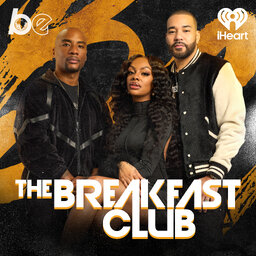INTERVIEW: Fawn Weaver On Building A Black-Owned Liquor Empire, The Story Of Nearest Green + More
The Breakfast Club Sits Down With Fawn Weaver To Discuss Building A Black-Owned Liquor Empire, And The Story Of Nearest Green. Listen For More!
In 1 playlist(s)
The Breakfast Club
The World's Most Dangerous Morning Show, The Breakfast Club, With DJ Envy, Jess Hilarious, And Charl…Social links
Follow podcast
Recent clips

FULL SHOW: Floyd Mayweather Sues Showtime for $340M, 50 Cent Reacts + Kelly Rowland, Method Man & DeVon Franklin Interview
1:43:11

DONKEY: Man Pulls Gun Out At Elementary School Over Son’s Basketball Playing Time
08:11

INTERVIEW: Kelly Rowland, Method Man & DeVon Franklin talks “Relationship Goals”, Personal love challenges, Hiphop + More
41:22
 The Breakfast Club
The Breakfast Club